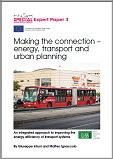Paper - Special Paper 3: "Making the connection-energy, transport and urban planning" by G.Inturri and M. Ignaccolo / 2016
SPECIAL Project Expert Papers - Part of the legacy of the SPECIAL is a series of six Expert Papers written by six different partners in the project. Five of these papers are already available as downloads. Ranging in topics from Masterplanning and Energy, to Policy frameworks and Transport, the papers are primarily targeted at town planners working at the local level.
Published by the Town and Country Planning Association, 2 March 2016
"Making the connection – energy, transport and urban planning An integrated approach to improving the energy efficiency of transport systems" By Giuseppe Inturri and Matteo Ignaccolo

Introduction
This SPECIAL project Expert Paper considers the key role that urban transport plays in meeting the Europe Union’s target of at least a 27% improvement in energy efficiency and a 40% reduction in greenhouse gas (GHG) emissions by 2030.1 It highlights the opportunities for improving energy efficiency through a combination of integrated land use and transport planning and the exploitation of new vehicle technologies.
An integrated land use and transport policy – such as a Sustainable Urban Mobility Plan – is one of the most long-term, strategic and effective ways of both reducing carbon dioxide emissions and improving the security of energy supply. The number of measures aimed at reducing the transport energy dependence of cities across Europe
is growing. Most rely on three basic strategies:
■ reducing the need for, and length of, trips;
■ shifting to low-energy transport options such as public transport and nonmotorised
modes; and
■ using improved vehicle efficiency technology and cleaner fuels.
This SPECIAL project Expert Paper considers the key role that urban transport plays in meeting the Europe Union’s target of at least a 27% improvement in energy efficiency and a 40% reduction in greenhouse gas (GHG) emissions by 2030.1 It highlights the opportunities for improving energy efficiency through a combination of integrated land use and transport planning and the exploitation of new vehicle technologies.
An integrated land use and transport policy – such as a Sustainable Urban Mobility Plan – is one of the most long-term, strategic and effective ways of both reducing carbon dioxide emissions and improving the security of energy supply. The number of measures aimed at reducing the transport energy dependence of cities across Europe
is growing. Most rely on three basic strategies:
■ reducing the need for, and length of, trips;
■ shifting to low-energy transport options such as public transport and nonmotorised
modes; and
■ using improved vehicle efficiency technology and cleaner fuels.
This Expert Paper highlights good practice in improving the energy sustainability of urban transport systems. It is aimed primarily at local authority planners, councillors and private sector practitioners, but is also intended to be useful for architects, energy practitioners, renewable energy providers, transport planners and anyone else seeking
to tackle climate change and reap the positive economic benefits that renewable energy approaches and low-carbon living can bring.
